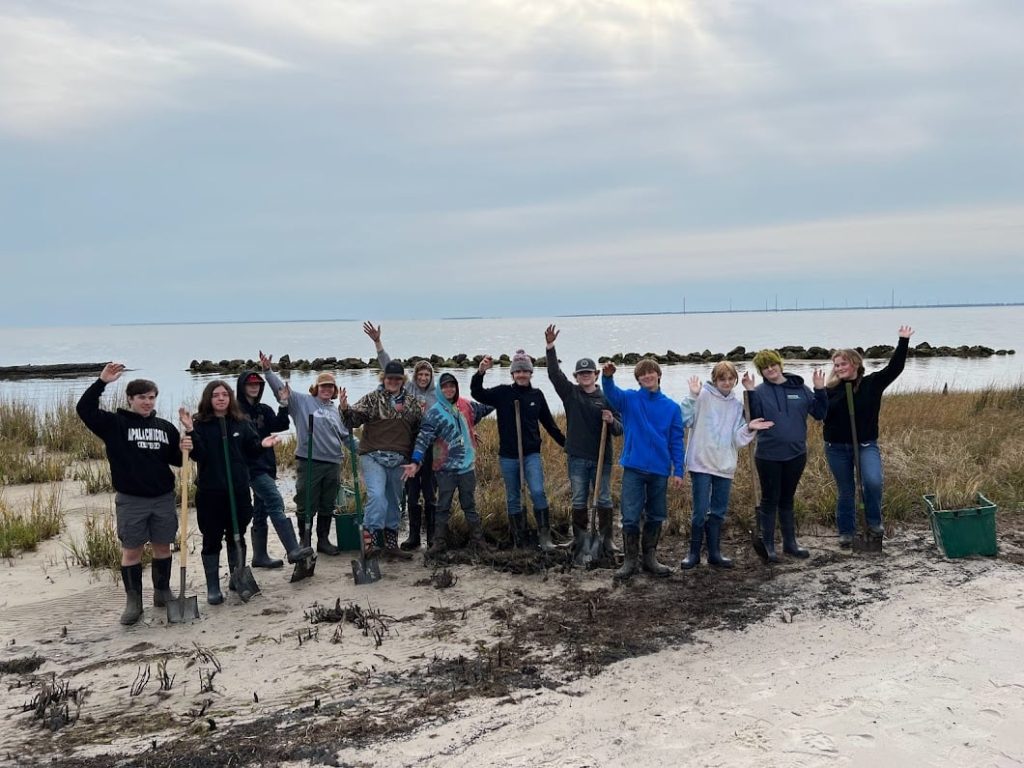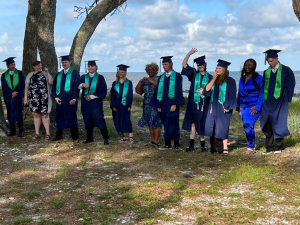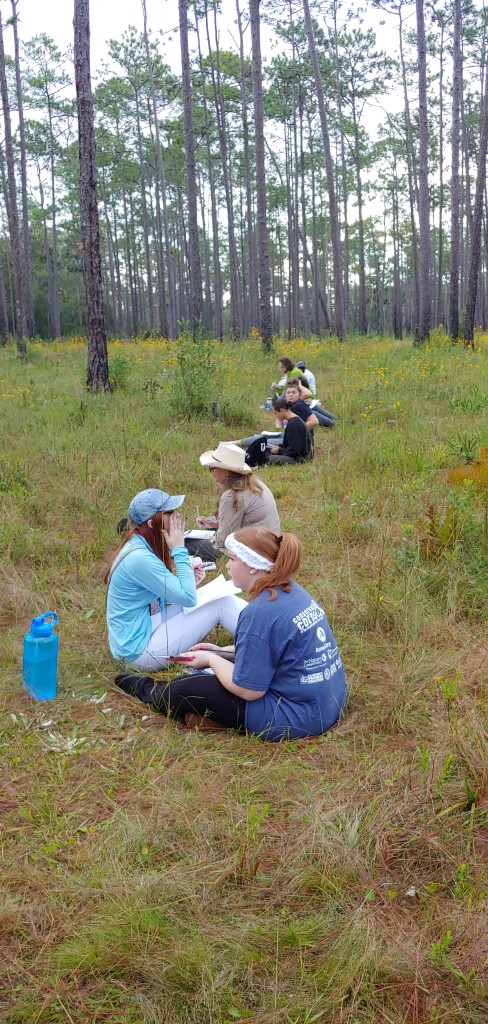
Editor’s note: This distinctive high school in the Florida Panhandle is another compelling example of how education choice manifests in rural areas, contrary to myths perpetuated by choice opponents in other states. To rebut that misinformation, reimaginED published a new white paper last week called “Rerouting the Myths of Rural Education Choice.” You can check it out here.
EASTPOINT, Fla. – They call it the Forgotten Coast because even though Florida is overflowing with 22 million people, this bend where the South meets the sea is not yet overrun.
Eastpoint, population 2,614, is the heart of the Forgotten Coast. Until a few years ago, its waterfront was lined with tin-roofed shacks, with workers in white rubber boots processing every bit of briny goodness that could be culled from Apalachicola Bay. Those seafood houses aren’t humming like they used to; for the bay’s world-famous oyster fishery, these are especially tough times. But even now, Eastpoint gets up before the rest of us, to head to work while the stars are still out.
That resilience is getting a boost nowadays from an unlikely source: An unassuming little school.
ED Corps High School serves kids who were not a good fit for traditional schools. It emphasizes life skills and job skills and industry certifications. And its students spend a third of their time outdoors, often working on conservation projects that mesh with the community fabric – like planting marsh grass to stabilize shorelines, or planting oysters so that someday, people can get back to tonging them up.
“The last thing you want is a job you’re not excited about,” said Joe Taylor, executive director of Franklin’s Promise Coalition, a community non-profit that counts ED Corps as a critical part of its portfolio. “This is where they grew up. They want to be in the woods or on the water.”

The goal isn’t just a diploma and a job, Taylor said. It’s breaking the cycle of generational poverty that is also part of this landscape.
“We believe in a long-term relationship,” he said. “We’re going to keep going until we land that plane.”
ED Corps is a school of choice. It serves 16 students, with 7 more on a waiting list. Fourteen of the 16 use state-funded school choice scholarships for lower- and middle-income families.
It’s important to point that out because in many states that don’t have expansive choice programs, choice opponents claim choice won’t work in rural areas, or, if it does, will destroy public schools.
ED Corps is more evidence that neither claim is true. The local superintendent attended the school’s first graduation ceremony two years ago. And the district, which oversees a single K-12 school, calls ED Corps when it has kids it thinks might better find success there.
“They recognize what we can do, and they realize their limitations,” said Elinor Mount-Simmons, ED Corps’ administrator.
Before she joined ED Corps, Mount-Simmons had been a public school teacher for 36 years. For most of that time, she wasn’t a fan of school choice; for seven of those years, she led the local teachers union.
But her views evolved as the evidence rolled in. At the district, Mount-Simmons spearheaded creation of a micro-school that served 40 high school students, 85% of them boys. The size and structure allowed the school to give its students more personalized attention.
Mount-Simmons was also able to use her creativity as an educator to shape programming. The school had a horticulture program, its own newspaper, and its own band – a band so good, in fact, that it was invited to play during high school lunch at the district’s main school.
Despite its successes, the micro-school was closed due to budget cuts. But the experience left an impression.
“I see the benefits of choice now,” said Mount-Simmons, who also sits on the board of directors of the county’s sole charter school. “My 40 kids had a blast and thrived under the small-school setting. I saw them blossom.”
Franklin’s Promise Coalition started ED Corps High School after seeing gaps in its conservation corps program.
It started the corps in 2015 to expose young adults to conservation work and get them the skills they needed to land good local jobs. The program took off, except for one problem: Too many corps members had never earned their high school diplomas. So while they were acquiring marketable skills and the industry certifications to prove it, they weren’t getting hired.

“We could not move forward without solving this issue,” Taylor said. “We knew if we wanted to have an impact, we had to aim a little younger.”
ED Corps students are typically from families of modest means. One parent is a seafood worker. One’s a car mechanic. One’s a nurse at the nearby state prison. Many face more than their fair share of challenges. One family was recently threatened with eviction because their plumbing wasn’t connected. Another is homeless, but off the streets for now thanks to friends and family.
Those challenges are part of the reason many ED Corps students struggled in their prior schools, Mount-Simmons said. They also got lost in the bigger-school environment. Didn’t have curriculum that was as hands-on as they needed. And didn’t have the flexibility to try things that might work better.
Even little things can be a difference maker. At ED Corps, students can listen to music with their headphones if they want, as long as they get their work done. There’s a “chill room” if, for whatever reason, their day goes south and they just need to step away for a few minutes.
Lori Mills said ED Corps has been good for her son Ryan. The 10th grader is glad to be outside a lot, and he’s learning things that matter to him, she said. For example, representatives from a local bank recently visited to talk about financial literacy.
“Ryan comes home and tells me all about this – and he never talks,” said Mills, who manages a community food pantry. “He was telling me about checking accounts and savings accounts and writing checks. He loved the bank.”
ED Corps senior Emily Mosley, 18, previously attended high school in a neighboring county. Challenges with anxiety made her feel overwhelmed by all the people and distractions. She and her family tried homeschooling, but she said she wasn’t self-disciplined enough. Things got so bad, she considered dropping out.
“My parents wouldn’t have let me, but I wanted to,” Emily said.
At ED Corps, Emily said she’s inspired by the conservation work, which is often done in conjunction with the conservation corps. Now she wants to be a park ranger.
Emily said she was particularly proud when her class raised oysters as part of an aquaculture project, then served them to the public at the local seafood festival. They were a hit.
“Apalachicola Bay is the oyster capital,” she said. “I feel honored to be part of something so important.”
“I’m glad ED Corps gave me a chance.”
Mount-Simmons said the freedom and flexibility that allowed ED Corps to respond to community needs can inspire other learning models, including in rural areas.
“Kids are not cookie cutter,” she said. “They come in all shapes.”
Schools should too.


